| Srl | Item |
| 1 |
ID:
181833
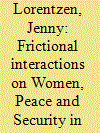

|
|
|
|
|
| Summary/Abstract |
More than 20 years after the adoption of UN Security Council Resolution 1325 on Women, Peace and Security, the international community is concerned with taking stock of its implementation in countries undergoing transitions from war to peace. This article contributes to a better understanding of the dynamics involved in implementing the Women, Peace and Security agenda through a focus on the frictional interactions that take place between different actors promoting women's participation in the peace process in Mali. Based on extensive fieldwork in Bamako between 2017 and 2019, it analyses interactions between different international and local actors in the Malian peace process through a discussion of vertical (between international and local actors) and horizontal (between local actors) friction. It finds that the way different actors respond to friction shapes relationships and impacts norm trajectories by triggering feedback loops, which in turn trigger new responses and outcomes.
|
|
|
|
|
|
|
|
|
|
|
|
|
|
|
|
| 2 |
ID:
127158
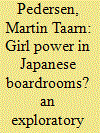

|
|
|
| 3 |
ID:
107646


|
|
|
|
|
| Publication |
2011.
|
| Summary/Abstract |
Why do some terrorist organizations deploy women on the front lines and in violent attacks? This study explores the social conditions, economic factors, and organizational characteristics that might explain women's participation in violent terrorist activity. With a new data set of 395 terrorist organizations, women's participation in terrorist attacks was quantified and coded. The logistic regression analysis results suggest that women's educational attainment, social rights, terrorist organization's age and size, and the level of a country's economic development are important predictors of the deployment of women in terrorist violence while a terrorist group's ideological or religious orientation and the level of democracy do not significantly influence the likelihood of women's participation.
|
|
|
|
|
|
|
|
|
|
|
|
|
|
|
|
| 4 |
ID:
090884
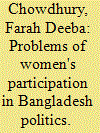

|
|
|
|
|
| Publication |
2009.
|
| Summary/Abstract |
Women's participation in politics is extremely limited in Bangladesh despite the country having had two prominent women leaders. Sheikh Hasina and Khaleda Zia gained the highest leadership positions in the government and the opposition through their family connections due to the low level of political institutionalization and the absence of suitable male heirs. By their family connections, they have overcome the problems that women otherwise face in politics. Why are Bangladeshi women not more prominent in politics? What are the problems women face when they participate in politics? Here the problems faced by women in politics in Bangladesh are analysed in both the public and the private spheres of patriarchy.
|
|
|
|
|
|
|
|
|
|
|
|
|
|
|
|
| 5 |
ID:
179197
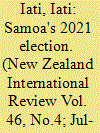

|
|
|
|
|
| Summary/Abstract |
Samoa's 2021 election has taken the country into uncharted waters. Three factors have created a perfect storm of events within a political environment marked by pockets of discontentment and heightened distrust of the HRPP government to produce the current outcome: the government's introduction of three controversial Bills into Parliament in early 2020, a vaguely drafted constitutional provision that is designed to increase women's participation in national politics and a knife-edge result of the election. Traditional ties provide the avenues for mediation and reconciliation and these might be utilised to resolve the current constitutional crisis and to overcome future dilemmas.
|
|
|
|
|
|
|
|
|
|
|
|
|
|
|
|
| 6 |
ID:
089396
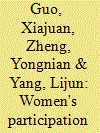

|
|
|
|
|
| Publication |
2009.
|
| Summary/Abstract |
Drawing on the data collected from three surveys in China's Zhejiang province during the period from 1999 to 2006, this article attempts to examine women's political participation in village autonomy and village elections in China. The data show that while men and women have obtained a very similar level of self-awareness and motivation in terms of political participation, China's patriarchal system, embedded in various forms of mindset and political practice, continues to constrain rural women's political involvement in a substantial way. The gender gap remains and the proportion of rural women in local power structures is declining. The article explains both the similarities and differences between men and women in rural political participation, and identifies some major causes for the decline of women's share in grassroots leading positions. It shows that there is no causal linkage between economic development and the improvement of women's political participation, and that the lack of political and other systematic supports leads to the low proportion of women in local power structures.
|
|
|
|
|
|
|
|
|
|
|
|
|
|
|
|
| 7 |
ID:
140807
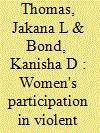

|
|
|
|
|
| Summary/Abstract |
While women have participated in a variety of militarized movements across time and space, the determinants of their participation have not been examined systematically. In this article, we seek to explain variation in women's involvement across different violent political organizations. Our research highlights the role that organizational attributes play in influencing women's presence in violent groups. We evaluate our hypotheses using an original dataset on women's participation in and characteristics of 166 violent political organizations across 19 African countries from 1950 to 2011. Our empirical results show strong support for our argument that organization-based opportunities for women's participation explain whether female members are present in a group.
|
|
|
|
|
|
|
|
|
|
|
|
|
|
|
|